Gore Vidal's Works for the Theater: 1956-1972
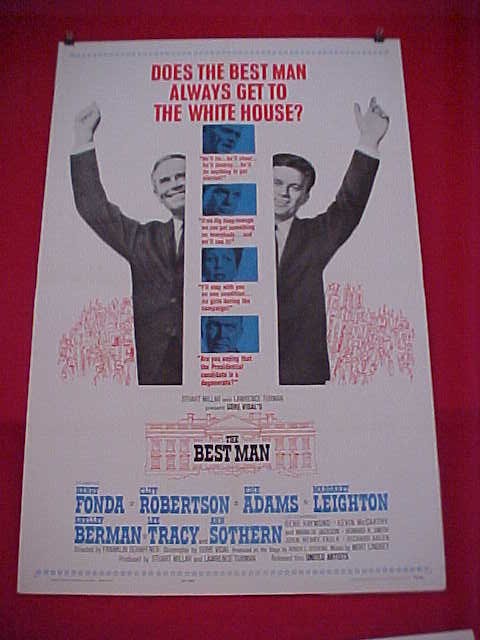 Gore Vidal became a playwright somewhat by accident. After the 1948
publication of his gay-themed novel The City and the Pillar,
major mainstream newspapers and magazines refused to review his subsequent
novels and so they
didn't sell very well. To supplement his income, he wrote five pulp novels
under three different
pseudonyms. He also turned to writing scripts for the emerging medium
of television, which had come to specialize in live drama and thus offered
satisfying work to serious writers like Vidal. This work lead him to write
screenplays for Hollywood films, and eventually to Broadway when one of
his live teleplays - the darkly humored science-fiction political satire
Visit to a Small Planet, so impressed critics and audiences that
a producer invited him to turn it into a theatrical play.
Gore Vidal became a playwright somewhat by accident. After the 1948
publication of his gay-themed novel The City and the Pillar,
major mainstream newspapers and magazines refused to review his subsequent
novels and so they
didn't sell very well. To supplement his income, he wrote five pulp novels
under three different
pseudonyms. He also turned to writing scripts for the emerging medium
of television, which had come to specialize in live drama and thus offered
satisfying work to serious writers like Vidal. This work lead him to write
screenplays for Hollywood films, and eventually to Broadway when one of
his live teleplays - the darkly humored science-fiction political satire
Visit to a Small Planet, so impressed critics and audiences that
a producer invited him to turn it into a theatrical play.
Vidal's first drama for live television, Dark Possession, aired
Feb. 15, 1954, on CBS' weekly series Studio One. Three months
later came Smoke, an adaptation of a story by William Faulkner
done for the series Suspense, again on CBS. And three months
after that, again for Suspense, came Barn Burning,
another Faulkner adaptation. In all, he got paid well for writing 16
script for various CBS and NBC live dramatic series between 1954 and 1960.
His teleplays included many adaptations of noted writers, among them
Ernest Hemingway (A Farewell to Arms), Henry James (The Turn
of the Screw), Stephen Crane (The Blue Hotel), and Robert
Louis Stevenson (Dr. Jekyll and Mr. Hyde). He even adapted
himself as the pseudonymous mystery writer Edgar Box, turning Death in
the Fifth Position into the dramatic thriller Portrait of a
Ballerina. His work as a writer for television turned very personal
on Dec. 13, 1959, when he wrote and narrated The Indestructible Mr.
Gore, a dramatic tribute to his grandfather, Sen. Thomas P. Gore of
Oklahoma. [This excellent web site provides a thorough listing of
Vidal's teleplays and where you can see them on archival tapes.]
During this period of his life, and continuing for more than 30 years,
Vidal dabbled in Hollywood screenwriting, usually for the money and most
often with mixed results because of the collaborative and commercial
nature of mainstream cinema. For his first screenplay he adapted Paddy
Chayefsky's well-received television play Wedding Breakfast,
opening up the drama in a way that marked it somewhat as his own. The

 movie came to theaters in 1956 as The Catered Affair. Then he
adapted Nicholas Halasz's book I Accuse!, about the Dreyfus
trial, followed by adaptations of Tennessee Williams (Suddenly, Last
Summer) and Daphne du Maurier (The Scapegoat). In the late
1950s, he spent some time rewriting portions of the script for
Ben-Hur, injecting a subtle homosexual undercurrent in one scent
that, to this day, Charlton Heston denies exists. He wrote an original
screenplay about the Roman emperor Caligula in 1979 that
Penthouse publisher and "movie producer" Bob Guccione turned into
a high-class piece of pornography - which Vidal disowned. And in 1986, he
penned a well-received, four-hour television adaptation of Lucien
Truscott's military thriller Dress Gray.
movie came to theaters in 1956 as The Catered Affair. Then he
adapted Nicholas Halasz's book I Accuse!, about the Dreyfus
trial, followed by adaptations of Tennessee Williams (Suddenly, Last
Summer) and Daphne du Maurier (The Scapegoat). In the late
1950s, he spent some time rewriting portions of the script for
Ben-Hur, injecting a subtle homosexual undercurrent in one scent
that, to this day, Charlton Heston denies exists. He wrote an original
screenplay about the Roman emperor Caligula in 1979 that
Penthouse publisher and "movie producer" Bob Guccione turned into
a high-class piece of pornography - which Vidal disowned. And in 1986, he
penned a well-received, four-hour television adaptation of Lucien
Truscott's military thriller Dress Gray.
By 1956, Vidal had established himself as a successful writer of
television drama. He edited a book, Best Television Plays, that
included his own Visit to a Small Planet, along with teleplays by
seven other famous television writers of the day, among them Rod Serling,
Paddy Chayefsky, Horton Foote and Tad Mosel. Also that year, Vidal
published Visit to a Small Planet and Other Television Plays,
collecting eight of his own live dramas. In his Foreword to the
collection, he confessed his reticence about writing for television: "The
novel is the more private and (to me) the more satisfying art. A novel is
all one's own, a world fashioned by a single intelligence, its reality in
no way dependent upon the collective excellence of others. Also, the
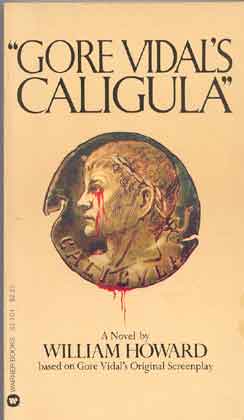 mountbankery, the plain showmanship, which is necessary to playwriting
inevitably strikes the novelist as disagreeably broad. Even the dialogue
is not the same in a novel as it is on the stage. Seldom can dialogue be
taken from a book and played by actors. The reason is one of pace rather
than of verisimilitude."
mountbankery, the plain showmanship, which is necessary to playwriting
inevitably strikes the novelist as disagreeably broad. Even the dialogue
is not the same in a novel as it is on the stage. Seldom can dialogue be
taken from a book and played by actors. The reason is one of pace rather
than of verisimilitude."
And yet, Vidal persisted, quite successfully and very profitably, in this
mode: During the 1950s, he became known as a talented author of television
scripts, one of which, The Death of Billy the Kid starring Paul
Newman, became a feature film, retitled The Left-Handed Gun.
Although Newman recreated his television role, Vidal did not write the
screenplay and later disowned the film, claiming that it compromised his
vision of the characters. Some 30 years later, he had another crack at the
story when he wrote the television script for Gore Vidal's Billy the
Kid, with Val Kilmer in the title role and Vidal appearing in a cameo
as a preacher. Another of his teleplays, Honor, aired in 1956 and
became - in longer form - a short-lived theatrical production under the
title On the March to the Sea.
From this almost accidental foray into television drama grew Vidal's work
as a playwright for Broadway, a career that began in 1957, reached its
zenith in 1960, and continued through the early 1970s. All of these plays
were published in one form or another, with the sole exception of A
Drawing Room Comedy, which was produced outside of New York in 1970
and never made it to Broadway. Vidal has not seen a new play of his
produced since 1972, although his 1960 hit The Best Man was
revived on Broadway in 2000 for a limited election-year run, impressively
retitled Gore Vidal's The Best Man. The experience so pleased him
that he's reportedly now at work on a play about Aaron Burr, adapting his
own 1973 novel on the scandalous vice president. He also revised and
revived his early 1960s play On the March to the Sea for a series
of staged readings in 2004-05.
Visit to a Small Planet (1957)
Kreton, a visitor from a far-away planet with a culture and a technology
far more advanced than ours, comes to Earth to witness what Earthlings do
best: make war. Unfortunately, his time-and-space-traveling craft landed
in 1950s America rather than during the Civil War - for which he came
appropriately dressed. Nonetheless, Kreton is determined to see a war,
even if he has to start one himself, which causes great distress for the
Spelding family with whom he's taken up temporary residence. And they'd
better watch what they think about their visitor: He can read minds -
including the mind of the family cat. As it turns out, Kreton is
considered to be a child on his home world, so his infatuation
with warfare - just like ours here on Earth - is ultimately
revealed to be the interest of a puerile mind.
In its time, satire like this was rather progressive - three sponsors
rejected the original teleplay before it finally came to TV - although
today the play seems to be more amusing than provocative. The
science-fiction world lauded the work because its success on television
and Broadway marked a popular breakthrough for the genre. The play
opened
on Broadway at the Booth Theater on Feb. 7, 1957, and ran for a very
successful 388 performances, all starring the distinguished actor Cyril
Ritchard, who created the role of Kreton on television and revived in the
Broadway play, which he also directed. Vidal published Visit to a
Small Planet in hardcover in 1957, and the complete text of the play
appeared in several magazines, including the March 1957 issue of The
Magazine of Fantasy and Science Fiction. The text even appeared in
Speculations, a 1973 science-fiction anthology textbook for high
school students. Jerry Lewis starred in a 1960 movie version of the play -
not adapted by Vidal - which had little to do with Vidal's original and
which Vidal disowned at the time of its release.
The Best Man (1960)
Vidal's most highly regarded and trenchant play naturally deals with
politics. It's an election year, and President Arthur Hockstader (Lee
Tracy) cannot run for re-election. He's also dying, so he has an eye
toward history and toward selecting his successor. Who will it be? There's
William Russell (Melvyn Douglas), an honest man of high moral values and
great intellect (think of Adlai Stevenson). And there's Sen. Joseph
Cantwell (Frank Lovejoy), a gamesman who knows what it takes to get what
he wants. Will Cantwell use potentially damaging true material about
Russell against him? Will Russell retaliate by using potentially damaging
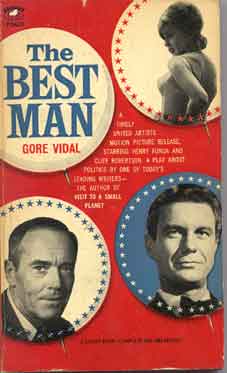 but almost certainly untrue material about Cantwell against him?
And who will the dying president endorse: the man he trusts, or the man he
thinks can win the election?
but almost certainly untrue material about Cantwell against him?
And who will the dying president endorse: the man he trusts, or the man he
thinks can win the election?
The Best Man opened on Broadway at the Morosco Theater on March
31, 1960, and ran for a
strong 520 performances, making it one of the dramatic hits of the season.
By 1964, Vidal had written a screenplay of the story that would become the
only
theatrical movie of his career that fully pleased him. The film cast Henry
Fonda as good candidate Russell and a steely Cliff Robertson as the
corrupt Sen. Cantwell. Lee Tracy reprised his role as the dying President
Hockstader. It's a fine film even today, sharply acted and directed (by
Franklin Schaffner), well worth the rental fee and reasonably priced to
own, thus a rare opportunity to see some of Vidal's theatrical work
preserved on film.
Vidal published the play in book form in 1960 and, like Visit to a
Small Planet, the text has appeared in several anthologies.
Throughout the years, Vidal revised the script of the play, taking out
dated historical references and replacing them with updated ones. The
currently available Dramatist Play Service playscript sets the drama in
July
1976, rather than the original July 1960. But in the fall of 2000, for
a Broadway revival of the play during the Gore/Bush presidential
election
season, Vidal returned to his original 1960 script rather than updating it
once again. That production - the first on Broadway since its 1960 debut -
starred Spalding Gray as Russell, Chris Noth as Cantwell, and Charles
Durning as President Hockstader. Reviews were generally positive and the
play finished its limited engagement, which lasted through December - only
slightly longer than the Bush/Gore election itself.
On the March to the Sea (1960-61)
Honor, a Civil War drama, aired on the NBC series Playwrights
'56 on June 19, 1956. It told the story of a dignified Southern
gentleman who instills high moral values in his sons, but who, when
confronted with the opportunity to live up to his own standards, finds
himself uncertain of the proper road to chose. The next year, Vidal got
the notion to expand the play for Broadway. He wrote the script on and off
for the next few years, and finally, in 1960, prepared the play for an
opening at the Hyde Park Playhouse, not far from where he lived in Hudson,
N.Y., with an eye toward taking it to Broadway.
There's now some dispute about whether the 1960 production ever saw an
audience. In a 2005 statement, issued at the time of a revival of the
play, Vidal said that "the original play was never performed in English,"
casting doubt on whether the Hyde Park production ever opened. But Robert
Stanton, in his 1980 bibliography of Vidal's work, said the play opened in
the summer of 1960 in Hyde Park; and Vidal's biographer, Fred Kaplan, said
that production got mixed to negative reviews and so never made it to
Broadway, closing after a few weeks in Hyde Park, sustaining itself for
that long on Vidal's name, and losing Vidal his $6,000 investment in the
production. Vidal and Stanton agree that the play got a staging in Bonn,
Germany, the following year. The script for the German production was
published as Flammen zum Meer.
Although unappreciated in the U.S., this minor play still appeared in
print as part of Three Plays, a hard-to-find 1962 British
hardcover book that includes Visit to a Small Planet and The
Best Man. In his short preface to the published text, Vidal says of
the play: "I have included this faulty play not only because I have spent
several years trying to get it right and I hate to think so much time was
spent to no use, but because, despite faults, it has some interest, even
in this version." Three Plays subtitles the drama "A Southern
Tragedy."
On the March to the Sea got a second life in 2004-05 with a
series of modest revivals in smaller venues. In October 2004, a theater
company in Hartford, Conn., conducted a staged reading of the play with
Chris Noth - noted for his roles on TV's Law & Order and Sex
and the City - portraying one of the characters. Noth had appeared in
the 2000 Broadway revival of Vidal's The Best Man and clearly
retained an affection for the author. This Hartford reading led to a staged
reading of the play in February 2005 at the Reynolds Theater on the
campus of Duke University in Raleigh-Durham, N.C. For these revivals,
Vidal said he "rewrote the entire play, adding a new Colonel Thayer to the
narrative." Noth played the lead in the Duke production, and Vidal spent
time in North Carolina during rehearsals and for the premiere. There's no
word on whether it will move to New York, although that was Vidal's
intention during the revival at Duke. Interestingly, all of the press
surrounding the Hartford and Duke productions referred to the "world
premiere" of Vidal's "new" play, the writers apparently unaware of the
drama's history. A piece in Playbill
finally set the record straight - with the help of a noted Vidal scholar.
Incidentally, Vidal's Honor is an interesting footnote in the
history of live television drama, which only lasted for a few years in the
1950s: According to Vidal, the final package of live TV dramas ever
produced was NBC's Playwrights '56, and the final drama in
that series was Honor. Thus Vidal wrote the swan song for a genre
that gave American culture such writers as Paddy Chayefsky, Rod Serling,
Horton Foote, Reginald Rose and Tad Mosel.
Romulus (1962)
To tell a story about the last days of the life of Romulus Augustus, who
served as ruler of the Western Roman Empire from 475-476 A.D. - the last
year of its existence -Vidal adapted Friedrich Duerrenmatt's play
Romulus der Gr��e. He embarked on this project after meeting
Duerrenmatt in 1959 and suggesting to the German author the idea of a
Vidalian adaptation of one of his plays. The play dealt with themes close
to Vidal's heart: history, politics and power - themes he would revisit
two years later in his novel Julian, the story of another Roman
emperor. The drama of Romulus opens with the Goths at the gate
of an empire on the brink of collapse - and with Emperor Romulus more
than happy to let it happen (for reasons of his own).
Romulus, like the fated ruler whose short reign it chronicles,
had a fleeting run on Broadway: It opened on Jan. 26, 1962, at the Music
Box Theater and closed 69 performances later. Cyril Ritchard starred at
Romulus, but the actor and the playwright could not recapture the success
of their collaboration on Visit to a Small Planet. Some critics
of the time blasted the play for being unfaithful to Duerrenmatt's darkly
majestic drama, claiming Vidal had made it frivolous with his adaptation.
So to set them straight, he published the complete text of the play in a
1966
hardcover edition that also included a translation of Duerrenmatt's
original.
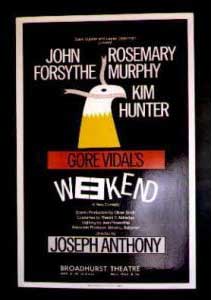
Weekend (1968)
Vidal made a moment of broadcast history in 1968 during the Democratic
National Convention when, on live television, he and William F. Buckley
came to blows. Seated with the taciturn ABC newsman Howard K. Smith
between them, Vidal taunted Buckley with liberal opinions and stinging
epithets. His anger mounting, Buckley finally lashed out: "Listen, you
queer," he said, "stop calling me a crypto-Nazi or I'll punch you in your
goddamned face and you'll stay plastered." The lawsuits between the two
men, exacerbated by their versions of the encounter published in
Esquire, went on for years.
If only Vidal's 1968 political play Weekend had generated so much
excitement. The play opened March 13, 1968, at the Broadhurst Theater and
closed after a paltry 22 performances, earning largely hostile reviews
(although Washington audiences and critics liked it). Kim Hunter and John
Forsythe graced the cast. The play, set in the Rock Creek Park home of
Sen. Charles MacGruder, tells a familiar and tart Vidalian story of
political ambition and amorality. Rife with contemporary references,
including remarks about Vietnam and President Lyndon Johnson, the play
reportedly so upset one of the president's daughters that she left in the
middle of a performance. Vidal himself grew up in Rock Creek Park - in the
home of his grandfather, Sen. Thomas P. Gore. So the setting of
Weekend is clearly autobiographical even if the action is not.
The play was never published as a book but remains in print as a
playscript available from Dramatist Play Service.
A Drawing Room Comedy (1970)
Vidal must have been in a weird place when he wrote this little two-act
comedy in the mid-1960s. He completed the play around 1970, and although
it was staged briefly outside of New York, it never made it to Broadway
and its script was never commercially published. What begins as an
insouciant post-dinner-party conversation in the drawing room of a wealthy
Manhattan home soon takes turns for the surreal and the absurd. It's Edgar
Box meets Pirandello meets Noel Coward meets Coming Through the
Rye, William Saroyan's 1942 one-act play about - well, the un-dead.
The play has six characters: Norman, who just left a job as an anti-Commie
propagandist for a government information agency, and who now works in
public relations for a television network; his wife, Grace; another
couple, the husband Jewish, the wife Norman's extra-marital lover of 10
years; a retired admiral in his 60s; and Melanie, his ex-lover's younger
sister, whom Norman desires but can't have. When Norman seems to drop
"d-e-a-d" of a heart attack after dinner, he's whisked first to Limbo -
where, Vidal says in the stage direction, "the acting style should be that
of perhaps the only entirely serious American play,
Hellzapoppin'." Then Norman goes to Hell, which means spending
eternity with Melanie (his unrequited adulterous love), plus the
occasional enema (people in Heaven love enemas).
But that's apparently a mistake, and soon Heaven is his destination,
white lights and all. That's where his trial takes place, with Jesus as an
onlooker and Grace as his judge. He's finally charged with the most
unforgivable crime - having lived - and the climax to his trial riffs on
Vidal's 1954 novel Messiah. When Norman learns that death is
"nothing" - literally, "no thing" - he says, "I hoped it would all add up
in some way." In the play's best line, Grace the Judge explains: "It added
up while there were things to be added up. Now the sum is finished."
The breezy dialogue in A Drawing Room Comedy takes parodic jabs
at government, religion, media, sexuality, marriage, religion, literature,
the elite, abortion, religion and much more. Small wonder it never got a
Broadway run. One character proclaims, "I love it when Arthur Miller
explains to us all the things that Harold Pinter doesn't." But another
prefers "the theater of vituperation, an evening of people insulting one
another, while all the time inquiring 'will you have another drink,'
occasionally varied by 'I'll mix my own.'" A Drawing Room Comedy
provides ample doses of both. We also get a brief passage mocking
heterosexual love and scolding society for its condemnation of - borrowing
a phrase - "the love that dare not speak its name." The dreamy prose of
Tennessee Williams also makes a cameo.
This all borders on camp, and it carries premonitory echoes of the
novels Duluth and Live from Golgotha, Vidal's later post-modern romps, or
"inventions" as he calls them. So this play may well have been an omen of
more widely received literary things to come.
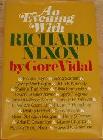
An Evening with Richard Nixon And. . .
(1972)
Vidal's last contemporary political play was also his most short-lived: It
opened on April 30, 1972, at the Shubert Theater and closed 13
performances
later. But the play lives on in hardcover and paperback editions readily
available from antiquarian booksellers, and in a
33rpm recording of
excerpts issued by A&M Records. It also introduced Vidal to
a woman who would become a long-time friend: the actress Susan Sarandon,
who made her Broadway debut in the play. Almost 20 years later, Vidal
would portray an aging liberal senator in the movie Bob Roberts,
written and directed by Sarandon's husband, Tim Robbins.
An Evening with Richard Nixon And. . . - Vidal dropped the
And. . . of the title for the book publication - is a
hodgepodge of historical research that brings Nixon together with George
Washington, Dwight D. Eisenhower and John F. Kennedy, with guest
appearances by Adlai Steventon, Spiro T. Agnew, Gloria Steinem, Harry S
Truman, Helen Gahagan Douglas, Hubert H. Humphrey, Martha Mitchell, Nikita
Khrushchev, Lt. William Calley and many others, all of them interacting in
a broad satire on political corruption and American history. In the
commercially published book version of the play (from Random House), Vidal
used a different typeface to indicate lines of dialogue that the
characters actually said or wrote at one time or another in their lives.
He includes complete bibliographical citations at the end of the book for
Richard Nixon's authentic statements, presumably in case anyone tries to
accuse him of putting words into the Great Criminal's mouth.
 Return to the Gore Vidal
Thumbnails introduction
Return to the Gore Vidal
Thumbnails introduction
If you came right to this thumbnail page and don't see a frame on the
left, please visit The Gore Vidal
Index now or after you've enjoyed the thumbnails, which you can access
from the main index page. And please send me comments if you have a thought, a suggestion
or a link to add to the index.
�Copyright 2005 by
Harry Kloman
University of Pittsburgh
kloman@pitt.edu

 movie came to theaters in 1956 as The Catered Affair. Then he
adapted Nicholas Halasz's book I Accuse!, about the Dreyfus
trial, followed by adaptations of Tennessee Williams (Suddenly, Last
Summer) and Daphne du Maurier (The Scapegoat). In the late
1950s, he spent some time rewriting portions of the script for
Ben-Hur, injecting a subtle homosexual undercurrent in one scent
that, to this day, Charlton Heston denies exists. He wrote an original
screenplay about the Roman emperor Caligula in 1979 that
Penthouse publisher and "movie producer" Bob Guccione turned into
a high-class piece of pornography - which Vidal disowned. And in 1986, he
penned a well-received, four-hour television adaptation of Lucien
Truscott's military thriller Dress Gray.
movie came to theaters in 1956 as The Catered Affair. Then he
adapted Nicholas Halasz's book I Accuse!, about the Dreyfus
trial, followed by adaptations of Tennessee Williams (Suddenly, Last
Summer) and Daphne du Maurier (The Scapegoat). In the late
1950s, he spent some time rewriting portions of the script for
Ben-Hur, injecting a subtle homosexual undercurrent in one scent
that, to this day, Charlton Heston denies exists. He wrote an original
screenplay about the Roman emperor Caligula in 1979 that
Penthouse publisher and "movie producer" Bob Guccione turned into
a high-class piece of pornography - which Vidal disowned. And in 1986, he
penned a well-received, four-hour television adaptation of Lucien
Truscott's military thriller Dress Gray.
 Gore Vidal became a playwright somewhat by accident. After the 1948
publication of his gay-themed novel The City and the Pillar,
major mainstream newspapers and magazines refused to review his subsequent
novels and so they
didn't sell very well. To supplement his income, he wrote five pulp novels
under three different
pseudonyms. He also turned to writing scripts for the emerging medium
of television, which had come to specialize in live drama and thus offered
satisfying work to serious writers like Vidal. This work lead him to write
screenplays for Hollywood films, and eventually to Broadway when one of
his live teleplays - the darkly humored science-fiction political satire
Visit to a Small Planet, so impressed critics and audiences that
a producer invited him to turn it into a theatrical play.
Gore Vidal became a playwright somewhat by accident. After the 1948
publication of his gay-themed novel The City and the Pillar,
major mainstream newspapers and magazines refused to review his subsequent
novels and so they
didn't sell very well. To supplement his income, he wrote five pulp novels
under three different
pseudonyms. He also turned to writing scripts for the emerging medium
of television, which had come to specialize in live drama and thus offered
satisfying work to serious writers like Vidal. This work lead him to write
screenplays for Hollywood films, and eventually to Broadway when one of
his live teleplays - the darkly humored science-fiction political satire
Visit to a Small Planet, so impressed critics and audiences that
a producer invited him to turn it into a theatrical play.
 mountbankery, the plain showmanship, which is necessary to playwriting
inevitably strikes the novelist as disagreeably broad. Even the dialogue
is not the same in a novel as it is on the stage. Seldom can dialogue be
taken from a book and played by actors. The reason is one of pace rather
than of verisimilitude."
mountbankery, the plain showmanship, which is necessary to playwriting
inevitably strikes the novelist as disagreeably broad. Even the dialogue
is not the same in a novel as it is on the stage. Seldom can dialogue be
taken from a book and played by actors. The reason is one of pace rather
than of verisimilitude."
 but almost certainly untrue material about Cantwell against him?
And who will the dying president endorse: the man he trusts, or the man he
thinks can win the election?
but almost certainly untrue material about Cantwell against him?
And who will the dying president endorse: the man he trusts, or the man he
thinks can win the election?


